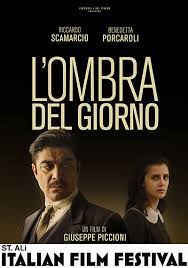
L’OMBRA DEL GIORNO/SHADOW OF THE DAY
Italy, 2022, 125 minutes, Colour.
Riccardo Scamarcio, Benedetta Porcarelli, Valeria Bilelllo, Wael Sersoub, Sandscheck Ceccarelli, Antonio Salines,, Lijno Musella, Costantino Seghi.
Directed by Giuseppe Piccioni.
A very serious film about Italy in the 1920s and 30s, the experience of fascism, presented on a smaller scale, in the town of Ascoli. While the focus is narrow, the experiences dramatised are a microcosm of what was happening in Italy in the Fascist era, under Mussolini, state efficiencies, about oppression, people spying on each other and denouncing each other, eventual persecutions and arrests, and Operation of the Jews.
The focus of the film is a veteran from World War I, military achievement and recognition of killing in defence of his fellows, but his leg injury and a limp. He is Luciano, played by Riccardo Scamarcio, now veteran of so many Italian films as well as international performances. He is disillusioned after the war because the population denounced the veterans rather than acclaiming them. And he has the fascist beliefs, and is in contact with various friends who have made their way in the fascist bureaucracy.
Much of the film shows the ordinary life of the town in this situation. The drama is heightened when a young woman, mysterious, Anna, ask for a job, is employed by Luciano and is very successful, working with the staff, including the joking antifascist cook who also sells material on the black market, even to fascists, helping Luciano managing the restaurant. And there is an attraction between them.
As the 30s progress, the visit from Hitler to Mussolini, people listening to broadcasts on the streets, the tension becomes more serious with the revelation about Anna and the arrival of her French husband, a writer. Luciano has to make decisions concerning Anna, whether to hide the husband or denounce him.
Anna is played by the striking Benedetta Porcarelli (who also appeared, as did Scamarcio, in The Catholic School just before this film).
There is political tension, oppression, investigations as well as the emotional repercussions, with Luciano finally having to make some decisions about himself and what he will do in the future, letting go of his fascist past.
- The title? The day – the fascist Europe? Its shadows?
- The period, costumes and decor, the fascist hero, black shirts, citizens in fear, conformism? Authorities? The broadcasts, propaganda? The musical score? The music, songs?
- Ascoli, the city, the restaurant, interiors, kitchen, dining, the seller? The square outside? The streets? Luciano’s apartment? The trip outside the city, the coast, the beach, the sea?
- The political stands of the film, antifascist? In the context of 21st-century politics?
- Luciano’s story, the 1930s, his memories of the war, top soldier, killing six, his injury and limp, the return from war, popular feeling against them, expecting acclaim? His fascist beliefs? Yet cautious with others expressing opinions? His father, working for the owner of the restaurant, his managing the restaurant, his staff and interactions? Customers? His lonely life? The past, Amelia, her leaving for Rome, her career, return to Ascoli, borrowing money from him? His friendship with the old professor? His friendship with Osvaldo, the fascist connection?
- The staff, Maria and her ordinary work, Giovanni, cheerful, antifascist, his deals with watches and jewellery? The hiring of Corrado, knowing him for many years, the courtesy to his mother? Corrado, young, ambitious, fascinated by the fascists, listening to them, discussions, meetings?
- Anna, outside the restaurant, the conversation with Luciano, his hiring her, her not having a story, willing to work, hungry, her success at work, Luciano’s admiration, with the other staff, friendship with Giovanni? The various jobs, serving in the restaurant, promotions? The bond with Luciano, their talking, giving her a lift, the outing, the dancing, the return home, the sexual encounter? The future?
- Anna as Esther, the Jewish background, finally telling Luciano, her husband arriving, in the restaurant, reactions? Anna and her plea, hiding her husband in the cellar, time passing, confined, his writing, antifascist, French background, trying to repair the wireless, the darkness and the loneliness pressing him? Esther and her resistance, the sexual experience and the consequences?
- The changes in Italy, the reporting of the stranger, Osvaldo and the photos, the denials? Osvaldo warning Luciana?
- The interludes with the girls and their gymnastics outside the restaurant? Rollerskating, the girl falling? Symbol of fascist action and ambitions?
- Rumours of war, the visit of Hitler, popular reaction, listening to the broadcasts on the streets?
- The time moving more rapidly, the weeks passing, the husband in the cellar and his growing his beard, getting desperate, the conversations with Luciano? Some bonding?
- Osvaldo and his men, the information about the husband, the photos, everybody denying? Osvaldo and his warning? The meal, the fascist celebration, Corrado and his wanting to join them, being left behind?
- Corrado overhearing about the seller, going down, his gun, the confrontation with the husband, Corrado boasting, the husband distracting him, the fight, his being shot? Luciano’s response, the body?
- Corrado’s mother, her pampering him, her coming to the restaurant, Luciano reassuring her?
- The decision for Esther and her husband to leave, the arrangement with the boat, the request that Luciano should come, the final encounter between Esther and Luciano? Packing, the drive, on the beach, the boat, the farewell?
- The end, Luciano knowing what he had done, throwing away his military medals, the change of attitude from his experience?